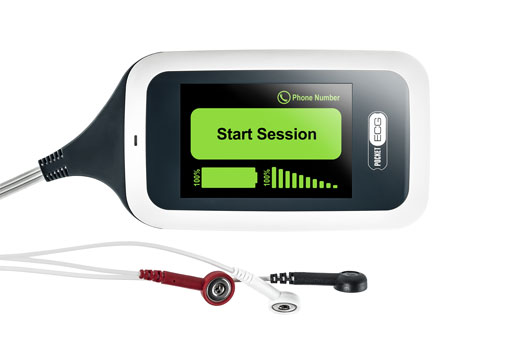The PocketECG aims to reinvent arrhythmia diagnostics through enhanced physical activity monitoring data.
June 28, 2017

The PocketECG aims to reinvent arrhythmia diagnostics through enhanced physical activity monitoring data.
Kristopher Sturgis
The PocketECG mobile cardiac telemetry system from MEDICALgorithmics includes extensive data on physical activity.
When it comes to diagnosing heart arrhythmia, running a simple electrocardiogram (ECG) often only tells part of the story of a patient's heart. ECGs are often used to diagnose arrhythmias, but they can also help diagnose other serious conditions like coronary heart disease and cardiomyopathy. While the results are quick and painless, the data can still be limited when it comes to long-term monitoring of the heart.
A new cardiac company based out of Poland, known as MEDICALgorithmics, aims to fill some of these data gaps with the introduction of their flagship technology, the PocketECG. The device was designed to provide healthcare professionals with a more detailed report on heart rhythm and activity, and includes extensive data on physical activity. Marek Dziubinski, president and CEO of the company, said that the company's vision is driven by science and mathematics to design better diagnostics.
"MEDICALgorithmics is a science-driven organization," he said. "[We are] using our knowledge of applied mathematics and medicine to create better diagnostics. What sets us apart is the way we process ECG signals and the diagnostic information we can derive from the processed data."
Dziubinski said that the device is the most complete arrhythmia diagnostic system on the market, as it provides the quality that reporting physicians have come to expect with traditional holter systems, while still maintaining the ability for long-term and online monitoring with symptom reporting and physical activity tracking.
|
Marek Dziubinski |
The device comes with a bevy of features that make it standout from other ECG technologies. Dziubinski said that it is the only mobile cardiac telemetry device cleared by FDA to date that can record and annotate every QRS complex and recognize its morphology. He said that combining this with the physical activity monitoring feature allows physicians to see a better correlation of data, which can provide more meaningful heart rate measurements that can better guide treatment decisions for patients.
Currently there are a range of cardiac conditions that cannot be diagnosed with a single ECG test or any other standard arrhythmia detection method. The PocketECG aims to become the first device that can make precise diagnosis possible through the complete disclosure of monitoring data, as well as the transmission of a patient's ECG for up to 30 days--allowing for the labeling and morphology-based classification of every single heartbeat.
"Many of our competitors developed products that were designed to capture the ECG at infrequent intervals and extrapolate potential arrhythmia information based on those limited signal samples," Dziubinski said. "The PocketECG transmits, discloses, and labels every heartbeat, enabling an efficient and full statistical ECG analysis with easily accessible reporting. We also provide access to the onset and offset for every arrhythmia episode. These are unique features of our technology that make precise diagnosis possible, even for the toughest arrhythmia cases."
Dziubinski said that MEDICALgorithmics has always approached the process of development and creation a little differently than other companies, maintaining a focus on finding the best real solution to existing problems. He believes this mindset sets MEDICALgorithmics apart and is the key to becoming a leader in the industry of cardiac diagnostics.
"Our latest PocketECG technology upgrade will allow physicians and nurses to distinguish between heart rate changes caused by arrhythmia, and those caused by a patient's physical activity," Dziubinski said. "We believe this is true innovation that adds value and addresses the need to objectively evaluate the ventricular rate of the heart."
It is these values that have helped MEDICALgorithmics evolve into one of the largest and fastest-growing cardiac monitoring companies in the world. The company also recently acquired a majority stake in Medi-Lynx Inc., a U.S. service provider that specializes in around-the-clock customer service and support to patients and clinicians across the country.
"I am an active scientist and what drives me and the rest of our team is finding solutions for real-life problems. We collaborate on research projects with scientists and electrophysiologists throughout the U.S. and in other parts of the world," he said. "I believe that our innovative technology, combined with the Medi-Lynx focus on tailored service, makes us a standout diagnostics partner for clinicians."
Enhanced data on heart activity and a strong emphasis on understanding the needs of physicians and patients seem like a formula for success. After all, we could all afford to listen to our hearts a bit more.
Kristopher Sturgis is a freelance contributor to MD+DI.
[Image courtesy of PR NEWSWIRE, Headshot courtesy of MEDICALGORITHMICS]
You May Also Like



